Unsolved murders: High profile cases yet to be closed
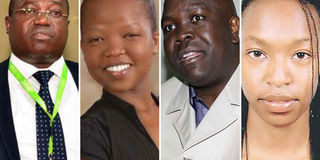
Unsolved murders: from left, Chris Msando, Careen Chepchumba, Jacob Juma and Mercy Keino. The list of murder cases that remain unsolved is growing. FILE PHOTOS | NATION MEDIA GROUP
What you need to know:
- A number of the country’s high profile murders remain unsolved while the trial of suspects in some of the cases has been akin to a mockery of justice.
The progress made in investigating the murder of Dutch tycoon Tob Cohen is so uncommon of the Kenyan police force which has a history of failing to crack dozens of gruesome murders.
In the case of Cohen, detectives have been able to retrieve his body and arrest suspects, who include his wife Sarah Wairimu.
However, a number of the country’s high profile murders remain unsolved while the trial of suspects in some of the cases has been akin to a mockery of justice.
Some of the most notorious unsolved crimes include the murders of whistleblower Meshack Yebei, university student Mercy Keino, businessmen Jacob Juma and William Munuhe, university lecturer Dr Chrispine Mbai, and IEBC official Chris Musando.
Here is a list of some of the unsolved killings.
- Mutula Kilonzo: Was it murder or drug overdose?
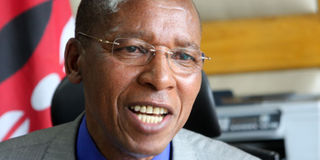
PHOTO/FILE
The Minister for Constitution Affairs Mutula Kilonzo.
Six years after he was found dead at his farm in Machakos County on April 27, 2013, questions still linger: Was it poison or a drug overdose that killed former Makueni Senator Mutula Kilonzo?
The scene of his death could make a perfect mystery murder thriller: a half-naked body of a billionaire foaming from the mouth and blood flowing from both the nose and mouth, and vomit.
Interestingly, the toxicology samples which would have resolved this puzzle were tampered with.
Prof Ian Calder, a UK pathologist hired by the family, could not conclusively make a finding as to what caused the heavy bleeding, due “to interference with the samples between Nairobi and UK”.
- Jacob Juma: dozens of leads, no arrests
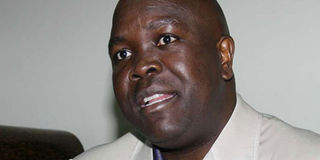
The slain businessman Jacob Juma was the local face of Cortec Mining Kenya (CMK) Limited. PHOTO | FILE| NATION MEDIA GROUP
Hundreds of people wanted businessman Jacob Juma dead.
They included his former business partners whom he had made the better off or swindled in his numerous business deals, the political class and even bartenders whom he had roughed up in his controversy ridden life.
Juma had also become a pain for government with his numerous exposé on official corruption.
Then on one cold night in May 2016, his lifeless body was discovered in his Mercedes Benz along Ngong Road on the same day that he filed an affidavit in a Sh2 trillion mining licence dispute with the government.
Investigators said Juma veered off the road after being blocked by a vehicle driven by the killers and landed in a ditch.
The assailants reportedly fired at the bullet-proof Benz, and when the bullets rebound, they resorted to breaking the car window, through which they executed him.
Among the first people to arrive at the site were police who ended up distorting the crime scene. They are reported to have gone through documents that were in the car and towed the vehicle with his body still inside.
Juma’s car, which is currently rotting at the police yard, could have provided vital clues on his murder had the probe not been bungled.
- William Munuhe: Who betrayed the FBI informant?
About 15 years ago, businessman William Munuhe was supposed to walk into a $5 million (Sh500 million) windfall by delivering Rwandan genocide fugitive Felicien Kabuga to the hands of the US Federal Bureau of Investigations.
Munuhe had agreed to lure Mr Kabuga to his home so that the FBI agents could arrest him.
When he failed to turn up to give up the man, who is one of the most wanted genocide suspects, police broke into his house and found the body of the 27-year-old bachelor with a burning charcoal stove placed next to his bed.
It was faked to look like suicide were it not for a shot in the head with the bullet entering through an ear.
To date, no headway has been made in unravelling his murder.
It is said that his murder was covered up by the inhalation of carbon monoxide. His murder still remains a mystery.
- Chris Msando: Looked like a love triangle
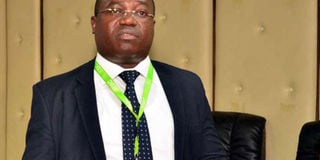
IEBC data centre and infrastructure boss Chris Msando. He was strangled, autopsy revealed. FILE PHOTO | FRANCIS NDERITU | NATION MEDIA GROUP
Whenever a murder probe narrative includes the presence of a woman in connection to the killing of a married man, it alludes to a crime of passion.
Such was the case for Chris Msando, a former electoral commission IEBC ICT manager whose body was discovered next to a corpse of a woman in the forest on the outskirts of Nairobi on July 28, 2017, a few days before the August 8, general election.
Msando was in charge of the country’s electronic digital voting counting system for the presidential election that pitted Jubilee’s Uhuru Kenyatta against Nasa’s Raila Odinga.
The body had deep scratches and cuts on his back and hands, the chief government pathologist said.
Wafula Chebukati, the IEBC chairperson, said that there was no doubt that Msando had been tortured and murdered.
Two years down the line, no one has been convicted of his murder. His frail and ailing mother cries for justice to date.
- Mercy Keino: Inquest cleared suspects

University student Mercy Keino's mangled body was discovered on the morning of June 17, 2011 after she had left a party in a huff. FILE PHOTO | NATION MEDIA GROUP
In October 2016, an inquest set up to determine the cause of death of university student Mercy Keino cleared former Kiambu Governor William Kabogo and five others who had been implicated in the 2011 death.
However, the same inquest opened up more unanswered questions on Keino whose mangled body was discovered on the morning of June 17, 2011 after she had left a party in a huff.
Government Chief Pathologist Johansen Oduor, who conducted the autopsy on the body, testified that it was difficult to determine what killed Keino, because of the multiple fractures she had sustained.
- Chrispine Odhiambo-Mbai: Devolution’s first political victim
Former university lecturer Chrispine Mbai, who is often cited as the brain behind the push for devolution, was shot by gunmen in September 2003.
The two men who were charged with his murder were later acquitted in 2005 for lack of evidence.
A Truth, Justice and Reconciliation Commission (TJRC) report concluded that Dr Mbai was killed because of his political views about devolution.
In May 2013, the commission gave the Director of Public Prosecutions 18 months to unravel the mystery surrounding the killing and the subsequent cover-up in the investigations.
The probe is yet to unravel anything, 36 months later.
- Meshack Yebei: ICC witness who was disappeared
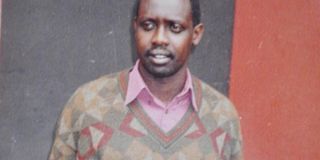
Meshack Yebei. PHOTO | NATION MEDIA GROUP
Meshack Yebei went missing from his home area at Turbo in Eldoret on December 28, 2014, and his badly mutilated and decomposing body being found months later in March 2015.
At the time of his death, Yebei had claimed to have been one of the defence witnesses in the case against Deputy President William Ruto and journalist Joshua Sang at the International Criminal Court during the trials for the 2017/2018 post-election violence suspects.
Yebei had publicly stated that he received death threats prior to his disappearance and subsequent death.
- Bishop Alex Muge: Killer charged for dangerous driving
The late Bishop Alexander Kipsang Muge was a critic of the Kanu regime.
One day, then Cabinet minister Peter Okondo warned the bishop that should he step into Busia, he would not leave alive.
On August 14, 1990, Bishop Muge decided to go to Busia for a crusade. On his way back to his Eldoret base, he died in a mysterious road accident.
The bishop’s death was later attributed to as an “ordinary” accident, with a former powerful government official terming it as an induced accident.
The driver of the ‘killer vehicle’ was jailed for dangerous driving but died in prison after serving five of his seven-year sentence.
- Fr Anthony Kaiser: Death termed as suicide
Fr Anthony Kaiser was a Roman Catholic priest and Mill Hill father from Perham, Minnesota, US, serving in various parts of the Rift Valley and western Kenya where he got renowned for being unafraid to speak out against corruption that permeated the Kenyan government.
In public forums and international press, Father Kaiser accused Kenya’s then president Daniel Moi of staging tribal wars in order to drive people from their land and later on seize it.
Throughout the 1990s, he had been followed, harassed and even beaten and placed under house arrest by Kenyan police.
On August 23, 2000, Fr Kaiser was shot in the back of the head with a shotgun.
His death, however, according to the police, was a suicide, death from a self-inflicted wound to the head.
- Sheikh Abubakar Shariff aka Makaburi: Neutralised radical

Sheikh Abubakar Shariff, alias Makaburi, when he appeared before a Mombasa court in this photo taken on March 27, 2014. He was buried Wednesday a few hours after he was shot dead by unknown assailants. PHOTO/KEVIN ODIT
The fiery jihadist Sheikh Abubakar Shariff aka Makaburi, was shot dead by unknown gunmen on April 1, 2014.
He was felled in a hail of bullets as he left Shanzu court premises, where he had gone to attend the hearing of a case involving 29 young men arrested in a police raid at Masjid Musa mosque.
He had been accused of recruiting Muslim youth into Al-Shabaab and radicalising them. To date, his death remains a mystery.
- Aboud Rogo: Extrajudicial killing?

The late Muslim cleric Aboud Rogo Mohammed at a Mombasa Court. Photo/FILE
The Muslim cleric Aboud Rogo was shot dead in July 2012 by people said to have been trailing him.
Rogo had been accused of arranging funding for the Al-Shabaab with the UN Security Council placing him in the sanctions list for providing material, logistical and technical support to the militants.
The Muslim Human Rights Forum condemned his death labelling it as an extrajudicial killing. It’s still not known who killed Rogo.
- Careen Chepchumba: Inquest yet to solve puzzle

An undated photo of Careen Chepchumba, who was found dead in her apartment in Kilimani, Nairobi, on February 12, 2012.
Seven years later after the death of Careen Chepchumba on February 12, 2012, her killer has not been found.
The Kenya Power electrical engineer was found dead in her house located in Santonia Court, off Kirichwa Road, Kilimani.
Magistrate Charles Ondieki ruled that Careen died by strangulation, and it wasn’t suicide or by accident.
Former TV personality Louis Otieno was the main suspect in the murder.
The inquest into her death said that the police bungled the investigation, leaving gaps that made it difficult to find her killer(s).
Until the Director of Public Prosecutions opens a fresh probe as directed by the court, Careen’s killer and the motive for the murder will remain a mystery.
- Oscar Kamau King’ara: Who silenced the activist?
Oscar King’ara, a lawyer, human rights activist and founder of the Oscar Foundation which offered free legal aid clinic, was ambushed and shot alongside Paul Oulu on March 3, 2009, on University Way near the University of Nairobi.
His assassination is widely attributed to his work in linking the police to execution of 500 Mungiki suspects, to which the police had termed as “fictitious”.
Ten years later after his death, the police have not found any fresh leads into his murder or have as well as abandoned the investigations.
- Tony Ndilinge: MP met death in dingy area
The Kilome MP Tony Ndilinge was shot dead in August 2000 in Githurai 44.
The Sh20,000 that he had in his wallet was left untouched while his car was later recovered in Dandora where it had been abandoned by the killers.
A week before he met his death, the MP had allegedly told his colleagues that some people were trailing him.
Truck driver Joakim Kagema and a woman identified as Margaret Wambui Njoroge were charged with the murder but later acquitted for lack of evidence.
In April 2003, the two suspects created a ruckus after they asked that former President Daniel Moi to record a statement with the police over the murder.
The truth on who killed Tony Ndilinge has never been known.





